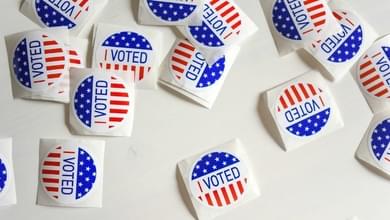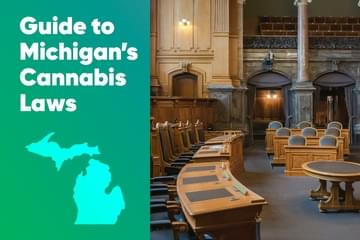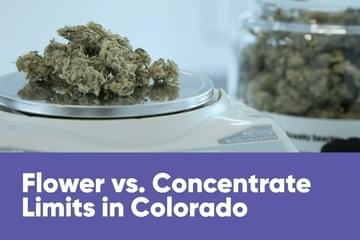
2022 Elections: Who Will Have Cannabis & Psychedelic Reform on Ballots?
Published on 10/8/22
The 2022 elections are rapidly approaching, and cannabis reform is making its way on the ballot in historically "red states."
As members of the cannabis community and a democratic system of government, it's important to stay on top of issues that will affect our lives.
Read on for the latest information on the fight for U.S. cannabis and psychedelic reform. You'll get a quick history of drug reform, the views of the electorate, and legislation on the ballot this November 2022.
Cannabis and Psychedelic Reform in the United States
Drug reform is the progression from prohibition to decriminalization or legalization. Advocates of changing America's drug policy come from various ideological positions. The two most popular are:
- Drug policy must be reformed because the government shouldn't be able to tell citizens what they can and can't put in their bodies.
- The government's war on drugs is unjust and disproportionately affects minority communities.
The divide among the pro-reform majority of the U.S. population is critical in understanding our current position on drug criminalization and the importance of participating in elections.
A Brief History of U.S. Drug Policy
Cannabis was essentially criminalized with the Marijuana Tax Act of 1937. The federal legislation was directly influenced by the fear of Mexican immigrants and black people. The year after the Marihuana Tax Act passed, black people were arrested for narcotics three times the rate of whites, and Mexicans were nine times more likely to be punished for the same charge.
In the wake of the civil rights movement, the Substances Act of 1970 passed under President Nixon. The legislation would make cannabis a schedule 1 drug along with heroin, LSD, ecstasy, quaaludes, and peyote.
All drugs that were deemed not to have the potential for medical applications fell into the strictest drug classification. This includes cannabis and psychedelics.
The Current State of Cannabis Legalization

In 1996, California broke the cycle of cannabis prohibition by legalizing medical marijuana. Grassroots cannabis advocates organized to get the Compassionate Use Act on the ballot, and the people of California voted to legalize cannabis for medical use.
Since then, states have pushed to pass legislation to decriminalize and legalize medical and recreational use. As of this writing, medical cannabis is legal in 39 states and the District of Columbia. Additionally, 18 states and D.C. have legalized recreationally.
Cannabis reform went five for five in the 2020 election, with recreational victories in Arizona, Montana, New Jersey, and South Dakota. Medical marijuana was legalized in Mississippi.
Psychedelic Reform in the United States
Psychedelics are currently in the awareness and decriminalization stage of drug reform, but they're moving forward.
Progressive cities like Oakland, Denver, and D.C. have decriminalized psilocybin, the active ingredient in magic mushrooms. Oregon has legalized psilocybin mushrooms for therapy.
The Impact Voting Has on Drug Reform
 Unsplash
UnsplashWhile presidential elections receive a higher turnout and more media coverage, voting in state and city elections has the potential to change our lives dramatically.
For instance, the campaigns to legalize medical marijuana in California began "on the ground." Today, activists raise awareness, fundraise, gather signatures, and let people decide if they want to continue drug prohibition.
In the United States, we have the power to organize and push measures for cannabis reform in even the most conservative states, counties, and municipalities.
Federal legalization, unfortunately, is more complex. It will require us to elect officials to represent our position in the House and Senate.
Republican vs. Democrat Voting
In the past, drug reform has been divided by party and generation. The partisan split still exists today, but it's not as drastic. Pew Research found that nearly 80% of Democrats and Democratic-leaning independents, and about half of Republican and Republican-leaning independents, favor legalization.
The Current Party Divide on the Federal Legalization of Cannabis
The American public is no longer divided on cannabis reform, as Gallup has legalization polling at an all-time high of 68%. Even moderate Republican lawmakers haven't shied away from supporting legalization and have written bills to decriminalize cannabis federally.
However, Republicans still oppose cannabis reform when it comes down to voting. The latest attempt at cannabis reform passed through the House with only three votes from the GOP. Currently, the MORE Act is in the Senate but might fail even though the Democrats only need 10 Republican votes.
Is Federal Cannabis Reform Possible?
Federal cannabis legalization bills never make it through the Senate because of ideological differences in how drug reform should look. Democrats push for social change that would address the systematic problems caused by the war on drugs, while Republicans favor removing cannabis as a schedule one drug, decriminalization, and leaving adult use up to the states.
Impacts on the Cannabis Industry
The cannabis industry is currently restricted to running on a state-by-state basis. Even chain dispensaries like Cookies are only allowed to source products made in the state in which they operate.
Federal legalization favors parts of the country with existing production industries and moderate climates. States like California, Oregon, and Washington might flourish if their supply chains weren't limited to state borders.
Federal prohibition has created a rise in products derived from hemp that could potentially be unsafe. Today, intoxicating synthetic cannabinoids (like Delta-8 THC) are allowed to be manufactured and sold online without the same regulations as a dispensary to anyone with a credit card.
States Voting on Cannabis and Psychedelic Legislation in November
 Unsplash
UnsplashHere are the states with cannabis or psychedelic reform either on the ballot or likely to make the signature requirement.
Arkansas
If the Arkansas Recreational Marijuana Initiative is passed in November, recreational cannabis will be legalized in Arkansas.
According to local Arkansas news, the movement should bring in well over 100,000 signatures before the deadline to get it on the ballot.
Missouri
Cannabis activists in Missouri were successful at getting adult-use cannabis legalization on the November ballot. If it passes, the initiative would amend the Missouri constitution to allow:
- Adult-use for all Missourians over 21 years old
- Automatic expungement for non-violent marijuana-related offenses
- A 6% state tax and up to a 3% local tax on marijuana products
- A minimum of 144 licenses to the existing 382 existing Missouri medical cannabis businesses
Oklahoma
Like Missouri, Oklahoma looks to further cannabis reform by implementing an adult-use program. On July 5, 2022, canvassers dropped off boxes containing over 164,000 signatures at the Secretary of State's office, which is 50,000 more than required.
After a signature verification process, the initiative should be placed on the ballot for the upcoming election in November.
Cities in Texas
Cannabis reform efforts in Texas are being held at the city level. Activists have successfully collected enough signatures to vote on decriminalizing cannabis in Harker Heights, Killeen, San Marcos, and Denton. Voters of Austin already voted overwhelmingly to decriminalize cannabis.
Colorado
Colorado was the first state to legalize recreational cannabis and continues to lead the way on drug reform. Denver decriminalized possession in 2019.
And this November, voters will decide to legalize psychedelic mushrooms statewide. The initiative wouldn't set up an adult-use program, but it would allow for personal use, growing, and supervised treatment centers.
If passed, you can expect a gifting exchange of psychedelic mushrooms to emerge in Colorado, similar to Washington D.C.
South Dakota
While South Dakota passed a recreational and medical marijuana initiative in 2020, it was blocked by the Republican Governor, Kristi Noem. After removing regulatory and tax structures and leaving details to be worked out by the state, cannabis reform is back on the ballot.
If passed, Initiated Measure 27 would legalize the personal use, possession, and cultivation of cannabis for adults.


















